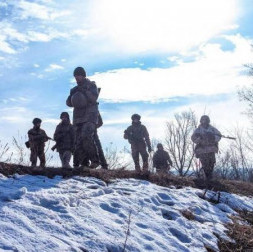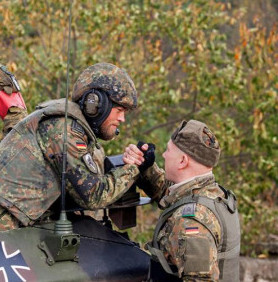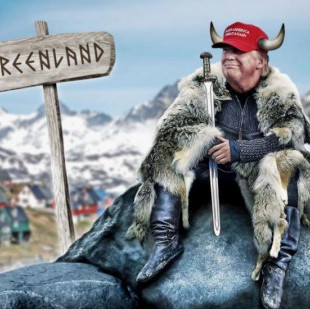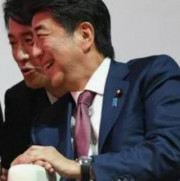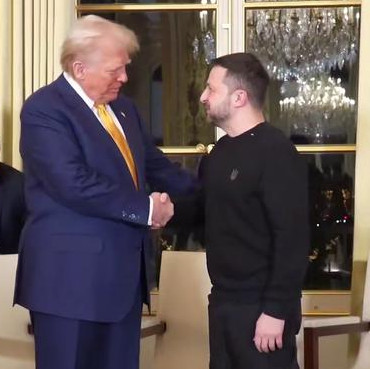The document adopted by the Parliament of Georgia says that “during the Russian-Caucasus war of 1763-1864... Russia’s political and military leadership had planned in advance and implemented ethnic cleansing of Circassian territories.” It also gives the maximum number of losses (however no serious historian could give an exact or even approximate figure) - 90 percent of representatives of Circassian people or as they call themselves - the Adyghe people and tribes were killed during combat operations or expelled from their homes.
Such statements by the Georgian leadership raise a smile if not puzzle the researchers of the Caucasian War of 1817-1964, who are well aware of archives and documents of that time. Why? Now in sequence.
The major cause of Russia’s entry into the Caucasus war was the ambition to liberate Georgia of the same faith from Persia and Turkey which oppressed it. When this task was accomplished, there emerged a critical necessity for Russia to protect roads and communications linking the Russian territory with troops in Georgia, which by that time had merged in the Russian Empire. These roads passed through the Circassian tribes’ lands, and the mountaineers constantly raided the fortified lines and interfered with relations with Transcaucasia.
Russia is accused of genocide of the Circassian people. Genocide is the destruction of an entire people along ethnic lines. But if Circassians still live in Russia, then what genocide can one talk about? If not genocide, then what? Maybe about brutal treatment of the Circassian nation after its defeat in the Caucasian War? It is doubtful, too.
After terminating the Crimean War in 1856 and then, in 1859, putting an end to Shamil’s imamat in the Eastern Caucasus, the Russian government decided at last the issue of the West Caucasus, too. The Emperor Alexander II himself arrived in the Caucasus. He gathered about 500 representatives of Transkuban tribes to offer his terms of the peaceful reconciliation. The Russian emperors did not usually vouchsafe to such conversations with Russian citizens who had claims against the government... He praised the courage of the mountaineers and their military skill, but indicated that they suffered huge and irreparable losses, whereas Russia had not yet throw out its main forces against them. But such forces will be put to use, because ties with the territory of Georgia of the same faith are of vital importance for Russia. But to avoid more bloodshed, the Emperor offers the following conditions: the Transkuban people will live in their lands and according to their customs, but will stop all raids (both on Russian settlements, and on each other) and will not prevent Russians from reclaiming Transcaucasia; the roads connecting Russia and Georgia pass through the mountaineers’ lands (furthermore, the mountaineers will be paid in gold for the alienated lands), but the roads will be guarded by troops and Cossacks; mountaineers will be exempt from conscription, but in case they wish to serve as volunteers - they will not be denied; they will have to pay certain taxes, but they will be collected by their own foremen, and these funds will be used exclusively for the provision of the necessary facilities in the region: in the first place – for the development of roads, crafts and trade.
All the proposals made by the Emperor, were considered by the Circassians at the Majlis in Sochi in 1862, and rejected. Some argue that the interference of Turkish and British agents, who promised to help foreign mountaineers, played its part. Following which the appointed governor of the Caucasus, the Emperor’s brother, Grand Duke Mikhail Nikolayevich gave the order to proceed with military action. As a result, on May 21, 1864 the Circassian tribes were defeated, and in Kbaada tract (nowadays - Krasnaya Polyana) a thanksgiving service was held in honor of the victorious end of the Caucasian War.
Since then, much of the Circassians enticed by Turkey’s fabulous promises, as well as due to agitation by their own rulers and Muslim clerics, decided to move to the Ottoman Empire – historians call this process ‘muhajirism’.
Estimation of the number of mohajirs does not seem possible, the views of researchers differ significantly (from 500 thousand to 900 thousand and more). In fact, the migrants did not find themselves in the best conditions: the Turks of ‘the same faith’ deported the Circassians to barren areas, young people were drafted into the military, and the rest, to survive, were forced to sell members of their families into slavery. It is not surprising that their population rapidly declined and soon many Circassians want to return.
Georgia says it is Russia to blame for the resettlement process of Circassians. But no word about the fact that the Circassians themselves chose this way, they left home taking a personal weapon and values, and they had an alternative at that - to move to Kuban, where Russia provided them with land much larger in area than they had. Moreover, Russia also bore the expenses for this resettlement which lasted 5 years.
Yet it must be noted that about 10% of the Circassians and Abkhazians preferred to come to the Russian terms and move out onto the plains, and they were willingly accepted and provided with all benefits promised by the Emperor, including a volunteer military service.
Over time, many of Circassian emigrants in Turkey forgot their native language, lost their national identity. Those who remained in Russia, did not forget their language, but on the contrary gained an opportunity to fully realize their cultural needs. And today the Circassians live in Russia where they had lived hundreds of years ago. And even where they had not lived - in Central Russia, Siberia, the Far East, Moscow and St. Petersburg.
It’s not worth forgetting about the humanity towards the subjugated peoples of the Caucasus, which was often manifested by the Russian side. One of the most vivid examples of that is the capture of Imam Shamil in 1859. Shamil was able to unite Dagestani and Chechens under his banner, under his guidance the Caucasian peoples fought with the Russians for 25 years. But after the capture, the Imam was comfortably settled in Kaluga, and was given a considerable remuneration, and then, when passions in the Caucasus calmed down, he was released in Mecca, where he died and was buried. He left many letters addressed to the Russian Emperor with words of gratitude and devotion.
Also there obviously was no room in the Georgian resolution to mention the massive participation of Georgians themselves in the Caucasus War on the side of the Russian Empire.
Besides the Detached Caucasian Corps, whose officer cadre was largely staffed by Georgian noblemen, many Georgian units fought against the mountaineers of Northern Caucasus (peoples and tribes of the Adyghe group, Lezgins and Chechens). Imereti regiment, Mingrelian, Gurian, Georgian battalions, etc. were created.
The Georgian elite gave the Russian Caucasus Army many chiefs and officers; suffice it to recall the legendary Prince Tsitsianov. The Georgian noblemen’s fighting qualities were praised by Aleksey Yermolov, Russia’s General Governor of Caucasus who had clearly chosen one of the sides - Russia.
Some Georgian units, who displayed particular firmness, became the basis for the formation of active units when imposing mandatory military service on Christians in the Transcaucasia. In 1849, to guard Kakheti, a Georgian horsed squad of hunters was formed, which in 1862 joined the Kutaisi irregular cavalry regiment and in 1886 was reformed into the Kutaisi Dragoon. In 1851, guarding of the Ozurgeti district was entrusted to a squadron of Gurian foot police officers (from 1877 – the Gurian foot squad, from 1899 - the 7th Infantry Battalion of the Caucasus). In 1831, the people’s volunteer corps of Signagi and Telavi districts formed a Georgian foot regiment, known as Jar, reorganized in the Georgian foot squad in 1849. In 1887 this unit became the basis of the 1st Caucasian infantry native squad, and in 1899 it was renamed the 5th Caucasian infantry battalion.
Under such names, these units are referred to in official documents of the Russian State Military History Archive. These documents describe how Georgian forces managed to ‘distinguish themselves’ in the fight against the mountaineers, with special, sometimes even unreasonable cruelty in battles and attacks on villages. For example, on January 13, 1824, the Mingrelian battalion discovered a large fortified village of the Circassian prince Misosta Aiteko. According to the Russian military historian and publicist, a contemporary with military operations R.A.Fadeyev, the village was completely burned, and its population died in the fire. On that day more than 1,000 people were killed, 139 persons were taken prisoner, 4,000 head of cattle and horses were captured.
It remains to add that in the Caucasian War Georgians were very valuable guides through the mountains for the Russian army commanders. The Russian Military Headquarters were in the Georgian Tiflis (Tbilisi). And the parade of victory over the mountaineers in the Caucasus War in Krasnaya Polyana, on May 31, 1864, was attended by Georgian and Megrelian units.
Attempts to define the events of 150 years ago as genocide have political implications and, most likely motivated by a desire of Russia’s geopolitical rivals to disturb the Caucasus by Georgia’s hands and, in particular, disrupt the Olympic Games 2014 in Sochi.
It is not impossible that the Georgian parliamentarians will surprise the world by recognition of more ‘genocides’ wherewith they will completely deprive this concept of any sense. It appears that if Georgia recognizes the Circassian genocide by Russia, it will also fully recognize its massive participation in it, and furthermore it will try to put the issue on the international agenda. It looks somewhat ridiculous.
It is therefore quite natural that the International Olympic Committee has rejected Georgia’s request to reconsider the decision to hold the 2014 Olympics in Russia. Georgia’s anti-Russian information and propaganda exercises and its attempts to rewrite history are not rewarded so far.
A resolution of the Georgian Parliament, which caused quite a stir in the circles of the Circassian movement, not least of all, as already mentioned, is an attempt to make additional problems for Russia on the eve of the 2014 Olympics in Sochi. Well, the attempt can be taken into consideration. However, the negative effect of this decision for Georgia will increase over the longer term. Accusations of political ethno-genocide can and will probably be brought against it, using the established by it political and legal precedent, by South Ossetians, Abkhazians and some ethnic minorities inhabiting the ‘small empire’.

